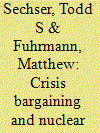| Srl | Item |
| 1 |
ID:
164067


|
|
|
|
|
| Summary/Abstract |
Living with a nuclear-armed enemy is unattractive, but, strangely, states seldom use their military power to prevent the enemy’s entry into the nuclear club. It is puzzling why preventive strikes against nuclear programs have been quite rare. I address this puzzle by considering the role of conventional retaliation, a subfield of deterrence that so far has received scant attention in the literature. I theorize the concept of conventional retaliation and test its explanatory power. First, I explore all historical cases where states struck another state’s nuclear installations and find none occurring when the proliferator threatened conventional retaliation. Second, I explore two cases where a strike was most likely, but the would-be attacker balked and find smoking-gun evidence that the threat of conventional retaliation restrained the would-be attacker. This evidence supports my claim that the threat of conventional retaliation is sufficient to deter a preventive strike against emerging nuclear states.
|
|
|
|
|
|
|
|
|
|
|
|
|
|
|
|
| 2 |
ID:
117997


|
|
|
|
|
| Publication |
2013.
|
| Summary/Abstract |
Do nuclear weapons offer coercive advantages in international crisis bargaining? Almost seventy years into the nuclear age, we still lack a complete answer to this question. While scholars have devoted significant attention to questions about nuclear deterrence, we know comparatively little about whether nuclear weapons can help compel states to change their behavior. This study argues that, despite their extraordinary power, nuclear weapons are uniquely poor instruments of compellence. Compellent threats are more likely to be effective under two conditions: first, if a challenger can credibly threaten to seize the item in dispute; and second, if enacting the threat would entail few costs to the challenger. Nuclear weapons, however, meet neither of these conditions. They are neither useful tools of conquest nor low-cost tools of punishment. Using a new dataset of more than 200 militarized compellent threats from 1918 to 2001, we find strong support for our theory: compellent threats from nuclear states are no more likely to succeed, even after accounting for possible selection effects in the data. While nuclear weapons may carry coercive weight as instruments of deterrence, it appears that these effects do not extend to compellence.
|
|
|
|
|
|
|
|
|
|
|
|
|
|
|
|
| 3 |
ID:
122938


|
|
|
|
|
| Publication |
2013.
|
| Summary/Abstract |
This article argues that government leaders need to bid farewell to the assumption that the rationality of all nuclear states can be assured for all times, that nuclear deterrence can never fail, and that we are somehow "nuclear immortal." It is a fundamental fact of the multinuclear world of the twenty-first century that deterrence built on the threat of a nuclear second strike will not work against "irrational" aggressors.
|
|
|
|
|
|
|
|
|
|
|
|
|
|
|
|